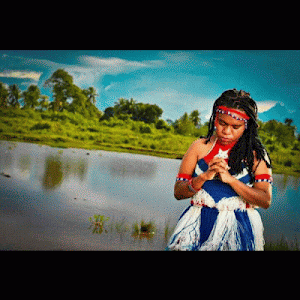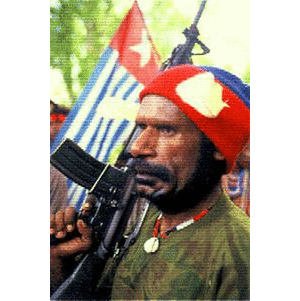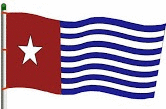 |
| Valentine Bourrat and Thomas Dandois, French journalists producing a documentary on West Papua, have been detained in the territory. |
JAKARTA,
Indonesia — Theo Hesegem was carrying a foreigner on his motorbike when a pair
of police intelligence officers pulled up behind him and ordered him to stop.
It was midday in Wamena, a small city in the highlands of West Papua,
Indonesia’s easternmost region and the only one foreign journalists need a
special permit to visit.
“Mr. Theo,
where are you coming from?” the officers asked.
Hesegem,
a human-rights activist, explained that he had been asked to give the woman a
ride by the head of the local indigenous people’s council, Areki Wanimbo.
Hesegem had been visiting Wanimbo’s office when the woman, Valentine Bourrat,
arrived with another French citizen, Thomas Dandois, Hesegem said. What the
three of them had discussed, Hesegem didn’t know, but he had been happy to
drive Bourrat back to her hotel.
“We’re
on heightened alert in Wamena,” the officers said, referring to a recent spate
of violence in the area. The previous week, two policemen were killed in a
shootout with the West Papua National Liberation Army, or TPN-PB, a diffuse
association of guerrilla groups that for decades have waged a low-level
insurgency against Indonesian rule. “Just take her back to the hotel,” the
officers told Hesegem. “We might need to call her in for questioning.”
Hesegem,
a native Papuan — the officers were Javanese, the country’s dominant ethnic
group — did as he was told. A few hours later, the police showed up at
Bourrat’s hotel. Dandois didn’t make it that far; he was intercepted by
officers on his way back from Wanimbo’s.
Today,
more than a month after the arrests, Bourrat and Dandois, journalists who were
filming a documentary on West Papua’s independence movement for Europe’s Arte
TV, remain in custody in the province’s capital, Jayapura. Wanimbo has also
been detained. Most journalists caught working on tourist visas in Indonesia
are deported immediately, but in this case local officials have said they will
seek a trial.
The
head of the local immigration office, Garda Tampubolon, said he hopes the two will
receive the maximum penalty of five years’ imprisonment. Perhaps more troubling, a police spokesman announced
last month that Bourrat and Dandois were also suspected of
conspiring with “armed criminal gangs” to “destabilize” West Papua, a much more
serious charge that carries a maximum sentence of 20 years.
“We
don’t know what’s going to happen to them,” said Marc Dandois, Thomas Dandois’
brother.
 |
| Benny Wenda, a West Papuan independence activist. |
The
incident is just the latest evidence of a foreign media blackout imposed on
West Papua. Since Indonesia took over the territory in 1963, the central
government has restricted the access of journalists, activists, researchers,
diplomats and aid workers. Conditions there can thus be difficult to discern
from afar, but the province is known for its active independence movement;
political prisoners, who are often jailed for raising the banned separatist flag; abuses by security forces; and the extreme
poverty in which most Papuans live despite their homeland’s vast natural
wealth.
While
the government says journalists can travel freely in some parts of West Papua,
as tourists can, reporters inquiring about political and human rights issues
are routinely denied the permit required to enter. The policy amounts to a de
facto ban on real reporting and is condemned by the United Nations, Western
governments and human-rights organizations. Indonesia ranks 132nd on Reporters
Without Borders’ latest World Press Freedom Index; the study specifically
mentions West Papua, calling it a “forbidden area” where “the work of journalists
is handicapped by draconian news control policies.”
“For
52 years now the Indonesian military has been trying to hide what they are
doing in West Papua and keep us silent,” said Benny Wenda, a West Papuan
independence leader who lives in exile in the United Kingdom. “This is why they
always try to stop foreign journalists’ reporting.”
Resources: http://america.aljazeera.com/















0 komentar:
Posting Komentar